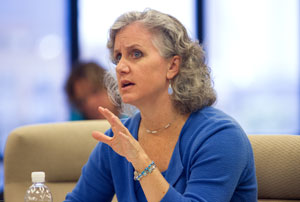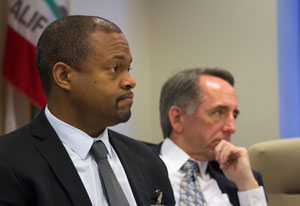Limited-practice license idea faces challenging path
By Amy Yarbrough
Staff Writer
If Washington State’s experience and California’s history is
any indication, it could be a long and contentious road ahead for a State Bar of
California group exploring the idea of a limited-practice licensing program.
 |
Paula Littlewood
Photo by S. Todd Rogers
|
Last month, Paula Littlewood, executive director of the
Washington State Bar Association, gave members of the Limited
License Working Group an overview of a program recently ordered by her state Supreme Court. Non-lawyers who meet certain levels of training can be licensed to provide
technical help on some civil cases. Littlewood did not mince words about the
challenges involved in getting to this point.
“It was a 10-year, pretty hard-fought battle,” she said.
Looking for ways to increase consumer protection and expand
legal services to poor Californians, the State Bar’s Board of Trustees began
studying the idea of limited-practice licensing following a bar retreat in San
Diego this January. The working group, an advisory body that will ultimately
make a recommendation to the Board of Trustees’ Regulation, Admissions and
Discipline Committee, held its first public meeting on April 11. The group heard
from Littlewood and other speakers, including a representative from the Law
Society of Upper Canada.
Under Washington’s program, which went into effect on Sept.
1, technicians must be trained and approved by the Limited License Legal
Technician Board. They work independently and help clients with tasks including
selecting and completing court forms, informing them of procedures and
timelines and reviewing and explaining pleadings. They are not, however,
allowed to represent their clients in court and cannot negotiate with opposing
counsel on the clients’ behalf.
 |
Limited License Working Group Chairman Craig Holden and State Bar of California CEO Joseph Dunn
Photo by S. Todd Rogers |
At the recent meeting, Littlewood told working group members
that instituting a similar program in California would mean “getting ahead of
the curve.” In her presentation, she noted that the legal profession has been
undergoing dramatic changes. Law school applications are declining, the income
disparity between the rich and the poor is widening, and consumers are
increasingly favoring a do-it-yourself approach to save money. The public is
also relying more heavily on technology, using services like LegalZoom, an
online legal document preparation firm.
“As lawyers, we have to figure out how we are going to serve
our client base,” she said.
Although it went into effect only recently, Washington’s
Limited License Legal Technician Program dates back to 2001, when the
legislation was passed that established the state’s Practice of Law Board to
investigate allegations of the unauthorized practice of law. The board was also
established to issue advisory opinions about the authority of non-lawyers to
perform legal services and to make recommendations to the Supreme Court about
services that non-lawyers could perform to fill the need for legal services.
The board submitted a rule to the Supreme Court in 2008, but it wasn’t approved
until 2012, with some modifications.
Critics of limited-practice licensing worry that allowing
non-lawyers to perform certain legal tasks may increase opportunities for
fraud. Trustee Karen Goodman, who is a member of the working group, asked
Littlewood to address that complaint and another concern, that the effort would
take work away from lawyers.
To the contrary, Littlewood said, consumer protection is one
of the “highest ideals” of her state’s program. She also cited figures
indicating that 85 percent of indigent clients and families of moderate means are
not being served anyway.
“The needs of the consuming public have never been ‘one size
fits all,’ ” she said. “There is so much work to go around. How can you take it
away from people?”
Under California law,
non-lawyers are already allowed to perform some legal tasks that don’t
constitute the practice of law, such as helping people fill out legal forms.
Paralegals working under the supervision of licensed attorneys (Business and Professions
Code Section 6450 et seq), unlawful detainer assistants, legal document
assistants (Business and Professions Code Section 6400 et seq) and immigration
consultants (Business and Professions Code Section 22440 et seq) registered by
the county clerks or California’s Secretary of State can also assist consumers
with legal needs in limited ways, short of practicing law.
Each year, the State Bar
receives hundreds of complaints about people engaged in the unauthorized
practice of law. But as it now stands, the bar has no authority over those
non-lawyers who step over the line, and can only send cease-and-desist letters
and notify law enforcement. Of particular concern are abuses in California’s
immigrant community, where notary publics , who have very limited powers, are
often confused with professionals called “notarios.” In some Latin American
countries, notarios can legally perform many official acts.
The State Bar studied the idea of licensing legal
technicians in the late 1980s and early 1990s. The American Bar Association did
so in the mid-1990s. Nothing came to fruition, even though all of the studies supported the concept.
Robert Hawley, deputy executive
director of the State Bar, pointed out that for years in the legal marketplace,
the supply of lawyers has risen, the demand for legal services has risen and
the cost of legal services has risen.
“Under the economic laws of
supply and demand, this is not possible,” Hawley said. “It can occur only in a
monopoly and perhaps it is time for lawyers to give up their monopoly on the
practice of law.”
Adding up what it costs for a
fully licensed lawyer to deliver full-service legal services in today’s market,
it is hard to deliver such legal services for less than $100 an hour, a price
many people cannot afford, he said.
“There’s a market below that to be served by trained
professionals. … Lawyers are not serving that market,” he added. “We have
simply priced ourselves into oblivion.”
Not everyone shares Hawley’s view.
In a Feb. 1 letter to State Bar President Patrick M. Kelly
and the Board of Trustees, Stephen Ensberg wrote that limited-practice licensing
would “simply give the veneer of legality to these unauthorized, ill-trained
practitioners who do more damage than good.”
“The proposal for licensed non-lawyers simply exposes the
public to more harm than is already the current situation,” the West Covina,
Calif.-based attorney wrote. “One only has to daily stand outside the Los
Angeles County Superior Court in Pomona or the Rancho Cucamonga Court of San Bernardino
and watch these individuals daily hand out fliers and cards for their purported
legal services and see the harm they are creating and doing.”
State Bar President Kelly said doing nothing is not an
option.
“Despite fundamental changes in society and the needs of
clients, the basic legal service delivery system we use today has not
fundamentally changed for more than 150 years,” Kelly said after the meeting.
“It is time to re-examine how legal services are being delivered, and the
California State Bar’s examination of limited-practice licensing is a strong
step in this direction.”
The next meeting of the Limited License Working Group will
take place from 10 a.m. to 1:30 p.m on May 22 at the State Bar’s office at 1149
S. Hill St. in Los Angeles.